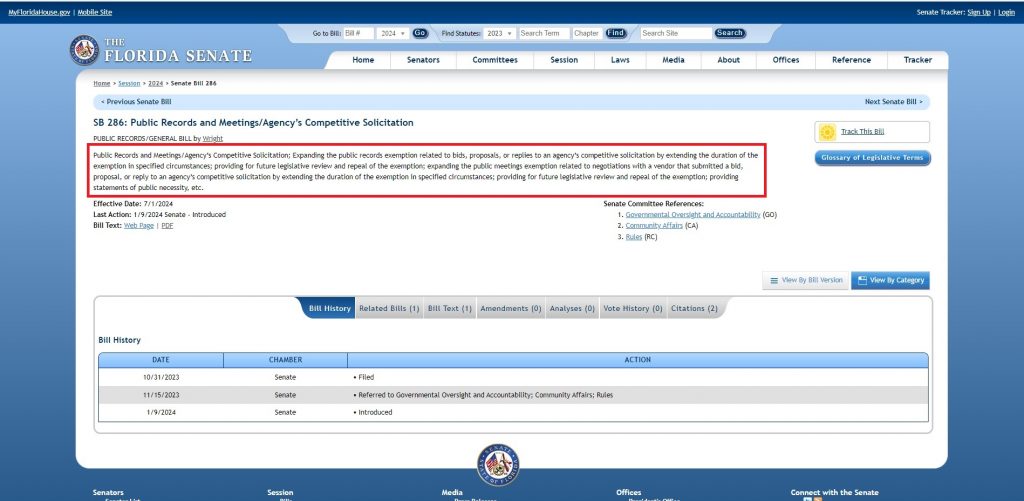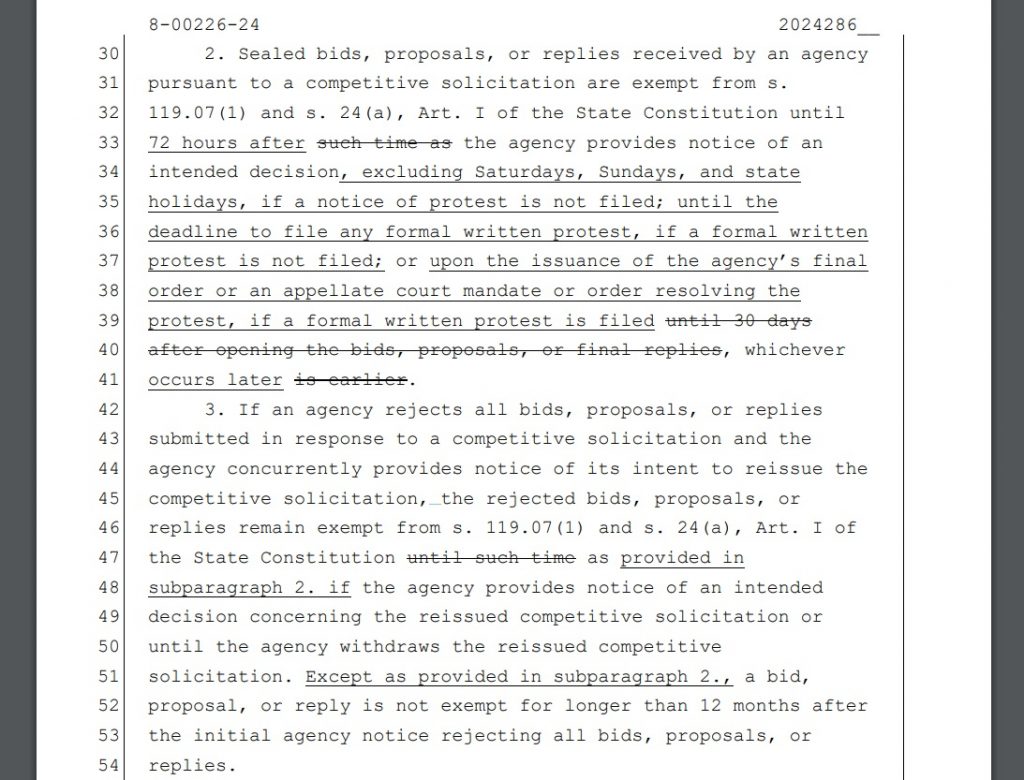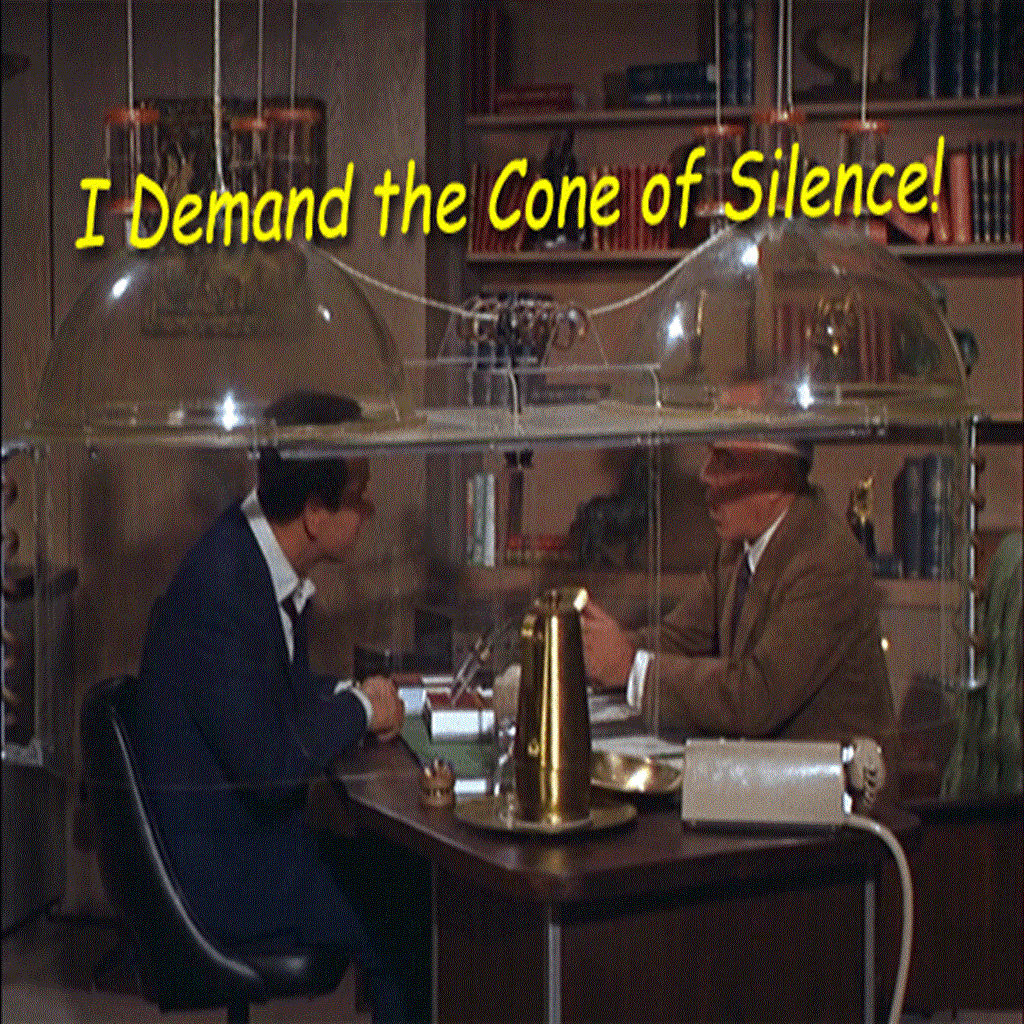
- January 14, 2024
- Sean Gellis
- 0
Welcome to FloridaProcurements.com (“FlaProc”). The FlaProc website is a free service provided by Attorney Sean Gellis to educate and assist technology companies in identifying and winning state contracting opportunities in Florida. Sean is a Florida Bar Board Certified Expert in State and Federal Government and Administrative Practice and holds an undefeated record in bid protest litigation. Before founding Gellis Law, PLLC, he served as Chief of Staff and Interim General Counsel of DMS, Florida’s lead procurement agency and the “business arm of Florida government.”
Here’s a link to my FREE GUIDES.
My Thoughts On The Effects of SB 286
This week I’m spotlighting Florida Senate Bill 286, a bill which could inhibit your technology company’s ability to review and correct mistakes made by agencies in the procurement process. The bill’s formal title is “SB286: Public Records and Meetings/Agency’s Competitive Solicitation.” This post examines the current state of public records bidding laws and analyzes the proposed changes in SB286. At the end, I’ll give my opinion and reasoning about whether it should be adopted into law. Hint: it shouldn’t.
First, some procedural history. SB286 was first filed in October 2023, by Senator Tom A. Wright, who represents parts of Volusia and Brevard Counties. A companion bill was filed in the Florida House, Florida House Bill 375, but was withdrawn prior to introduction. This did not deter Senator Wright. He proceeded to introduce SB286 on January 9, 2024, during the first day of Legislative session, despite the companion being withdrawn.
The summary of the bill is on the website:

After reading the bill’s summary, I see it proposing two substantive changes. It proposes to:
- Extend the duration of the competitive solicitation exemption; and
- Expand the public meetings exemption to include negotiations and extend the duration of the exemption.
I didn’t find the summary super helpful, and I’m sure neither did you even if you have a working knowledge of Florida public records laws. For those who don’t, I’ll briefly close the gap and explain the current state of public access to bidding documents.
Current Exemptions Related to Public Records and Bidding
I’m sure you already know the public has access to contracts and other bidding documents under Florida’s broad public records laws. This includes your competitors who can access your bidding documents after the contract has been awarded. However, you may not be aware of the exemptions that are in place during the procurement process and the reasons underpinning them. The exemptions are found in section 119.071(b) and (c), Florida Statutes.
Protections for Your Bids/Proposals/Replies
I’ll try to make it as simple as possible. If a document is “exempt” under Florida public records laws, then it means a member of the public cannot access the document. This includes your competitors. Some quick facts about the current public records exemption for bids.
- The exemption applies to any “competitive solicitation” which is defined for purposes of public records laws as “the process of requesting and receiving sealed bids, proposals, or replies in accordance with a competitive process, regardless of method of procurement.” § 119.071(1)(b)1., Fla. Stat.
- The exemption applies to any sealed bid, proposal, or reply that your company submits during a competitive solicitation, until either the agency awards the contract, rejects all bids, or until 30 days after opening the bids, proposals, or final replies, whichever is earlier. § 119.071(1)(b)2., Fla. Stat.
- If the agency decides to reject all bids and start over by stating its intent to reissue the competitive solicitation, then your bid documents are exempt until the new contract is awarded or the procurement is withdrawn. However, the exemption cannot last longer than 12 months following the agency’s notice of reissuing the procurement. § 119.071(1)(b)3., Fla. Stat.
Distilling that down for you even further, nobody from the public can see your technology company’s bidding documents until the public notice of award is posted on the Vendor Information Portal (formerly known as the Vendor Bid System), or 30 days passes, whichever is earlier. If all bids are rejected, and there is an intent to reissue the procurement, then your bid documents are exempt until the new contract is issued, or 12 months passes, whichever comes first.
These protections have been in place for a long time and generally protect the sanctity of your bid documents until the agency makes its final decision. I understand that sometimes agencies take a long time to award, which would implicate the 30 days cited above. However, even if an agency receives a public records request on day 31, in my opinion the agency will deliberately delay responding to the request until the award is made.
This avoids allegations of unfairness in the bid process. Further, the likelihood of a vendor suing an agency over a public records request, while trying to win the contract, is small. What kind of business wants to start a relationship with an agency this way?
Protections for Your Negotiations with the Agency
There’s also existing protections for companies who engage in negotiations with an agency, usually as part of the Invitation to Negotiate (ITN) process which is unique to Florida state procurements. The exemption provides that “any portion of a meeting at which a negotiation with a vendor is conducted pursuant to a competitive solicitation, at which a vendor makes an oral presentation as part of a competitive solicitation, or at which a vendor answers questions as part of a competitive solicitation is exempt” from Florida’s public records laws. § 286.0113(2)(b)1, Fla. Stat.
The exemption lasts until the agency provides notice of an intended decision (posts the award on VIP/VBS), or until 30 days after opening the bids, proposals, or final replies, whichever occurs earlier. § 286.0113(2)(b)2. Fla. Stat. The words “final replies” matter here because it’s universally accepted to mean the Best and Final Offer (“BAFO”) submitted at the end of negotiations in an ITN. The only procurement vehicle that should even contemplate negotiations is the ITN, so the 30 days is not an issue as long as the agency awards within 30 days of receiving BAFOs, which only occurs at the very end of the process.
The purpose underlying these exemptions is to ensure fair and open competition. They prevent companies from seeing each other’s bids/proposals/replies until after the agency has evaluated the documents and made a decision. Otherwise, you’d have your competitors seeing your proposal before it was even awarded, which could stifle competition and prevent bidders from making full disclosures in the procurement process. This is particularly true in the ITN process where Replies are scored and then negotiations occur. If your competitors were allowed to view your Reply before negotiations, they could modify their offering or use that knowledge against you. This would go against the legislative acknowledgment that “fair and open competition is a basic tenet of public procurement; that such competition reduces the appearance and opportunity for favoritism and inspires public confidence that contracts are awarded equitably and economically . . .” § 287.001, Fla. Stat.
The Timing Of Bid Challenges
A whole article could be written on challenging procurement decisions in Florida. For purposes of this article, I’m going to give you a basic and quick overview because SB 286 bases the timeline of the public records exemption on whether challenges are filed.
In Florida, a challenge to a procurement decision is called a “Bid Protest.” Generally, a notice of intent to protest an agency decision must occur within 72 hours (excluding holidays and weekends) of the agency posting the decision on the VIP/VBS. Every single competitive solicitation is required to inform you that failure to file a notice of intent to protest within this time frame is a waiver of your right to challenge the agency decision. In administrative law land, the agency’s posting on VIP/VBS is known as a “point of entry” which allows a person into the administrative process. A bid protest can target the specifications, addenda to the procurement, or the intended award.
To launch a challenge, the bidder submits a notice of intent to protest to the agency within 72 hours. Within 10 days of submitting the notice, the bidder must file its Formal Written Protest with the agency. The agency then must refer it to the administrative court (Division of Administrative Hearings) for a trial.
Why does any of this matter? Because as we learned a minute ago, the public records exemption currently ends when the agency posts the intended award. This means that once the agency announces a winner, it is customary for every bidder to submit a public records request asking for copies of everyone else’s bids. This is done for different reasons, but primarily the losing bidders want to see their competition’s documents to figure out why they lost. Occasionally, a company find that the agency made a major error which necessitates a bid protest challenge. Usually though, companies just want to learn why they lost, fix the mistakes, and try to do a better job next time. This process has been in place for decades and works quite well.
SB 286’s Proposed Changes and Why They Don’t Make Sense
Enter SB 286. The changes proposed in SB 286 would require bidders to launch formal bid protest challenges and obtain the other bids in discovery. This is a costly process, and the effects might not have been fully considered when drafting the bill. Other proposed changes make little sense because the law already provides exemptions under those circumstances. For example, the bill seeks to exempt negotiations, but they’re already exempt.
SB 286 would effectively remove the ability of vendors to obtain their competitors’ bids in a meaningful way. The way I read it, a losing bidder could only view the other bids by waiving their right to challenge the award, or by launching a bid protest in the dark without even seeing the other bids. It creates a chicken and egg problem. How can a bidder file a well-drafted and argued case about the bid if it isn’t allowed to see the bid until after it files the challenge. This would be the state of the law under SB 286.
The Text of SB 286
Let’s take a hard look at some of the proposed statutory changes in the bill and you’ll see what I’m saying.

As you can see in the picture above, the bill would modify the “until such time as the agency provides notice of an intended decision” language. Under the new language, the bid, and the recordings of the negotiation sessions, are exempt in following circumstances:
1. Until 72 hours after the agency provides notice of an intended decision, if a notice of protest is not filed.
- This means that if you want to see the other bids, you can simply choose to accept the agency’s decision, no matter how right or wrong, waive your right to protest, and then finally have an opportunity to see if the agency made an error. By the time you discover the error, you have waived your right to complain about it.
2. If a formal protest is not filed.
- Let’s say you went ahead and preserved your rights by filing a notice of intent to protest. Great. You still can’t see the other bids. Your only option here is to waive your right to protest by failing to file the Formal Written Protest and then you can see the other bids.
3. Upon the issuance of the agency’s final order or an appellate court mandate or order resolving the protest, if a formal written protest is filed, whichever occurs later.
- Assuming you decided to file a Formal Written Protest, which would be quite hard without having any idea what the winning bidder even submitted, then you still can’t get the records under public records laws. You would have to engage in discovery proceedings at the Division of Administrative Hearings (DOAH), on an expedited basis, to decide whether or not you even have grounds to file a protest. If it turns out you didn’t have a proper basis you could potentially be hit for filing a frivolous lawsuit. Makes a lot of sense, right?
This bill would negate anyone’s ability to meaningfully review agency’s bid decisions. It’s anticompetitive in my view. It doesn’t protect anything except the winning bidder. Even then though, the bid is still going to become public so what benefit is even gained by adding this complicated waterfall timeline? I don’t see any.
The Bill Creates Exemptions that Already Exist
Turning to another section, the bill seeks to make exempt that which is already exempt. It contains long paragraphs trying to explain the need for these changes. For example, as to bids, proposals, and replies, the bill states “Temporarily protecting such information ensures that the process of responding to a competitive solicitation remains fair and economical for vendors, while still preserving oversight after a competitive solicitation decision is made or withdrawn.”
The law already protects these documents until the award is made, or 30 days after submission, meaning that the agency reached its decision while all bids, proposals, and replies were protected from public view. All this bill does is make it impossible for a losing bidder to find out why they lost without filing an expensive bid protest in the dark. The current law protects bids, proposals, and replies during the process, and allows for oversight via a bid protest challenge after the award is issued and competitors can review the bid to determine if a protest should be pursued.
Protip: If the 30 days is the issue, then just remove that language.
The next part of the bill, beginning on line 127, basically states it is a public necessity that negotiation sessions be exempted. I agree because it’s already the current law of the land. The bill then says on line 148:
I don’t think anyone would disagree with this statement, but I still see a problem. Go scope lines 70-78 of the bill. These lines show the existing exemption applicable to negotiation sessions. As I discussed earlier in this article, the existing law already exempts negotiation sessions from public records laws until after the agency makes its decision, or 30 days after the “final reply” which means the BAFO. Let me be clear about this. Under current law, there are no public disclosures allowed of a negotiation session until after the agency makes its decision and notifies the world via posting on the VIP/VBS.
Protip #2: If the 30 days is the issue, then just remove the 30 days.
Conclusion
I highly doubt this bill came out of thin air, but it appears whoever wrote it doesn’t fully understand the current state of public records and bidding laws, or the long term ramifications of preventing bidders from accessing winning bids unless they file a protest.
I recommend AGAINST SB 286 because it makes the process of determining whether to file a bid protest impossible. It also confuses the current state of public records procurement law and makes it appear that negotiations are not exempted or protected when they currently are.
I SUPPORT the idea of removing the 30 days limitation on the exemption because I understand some complex procurements can take a long time to evaluate. It seems fair to keep them exempt until the notice of award is issued. However, if I’m being honest, I see little competitive advantage to sharing bids (ITB) or proposals (RFP) after the agency has received them. The cone of silence prevents your competitors from contacting the agency about the bid anyway. The release of your proposal would not in any way give your competitors a better chance of winning the contract. It would likely make a difference in an ITN, but as I discussed earlier the exemption applies until 30 days after submission of final replies a/k/a BAFOs.



